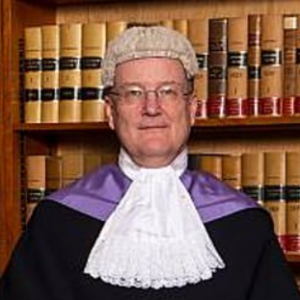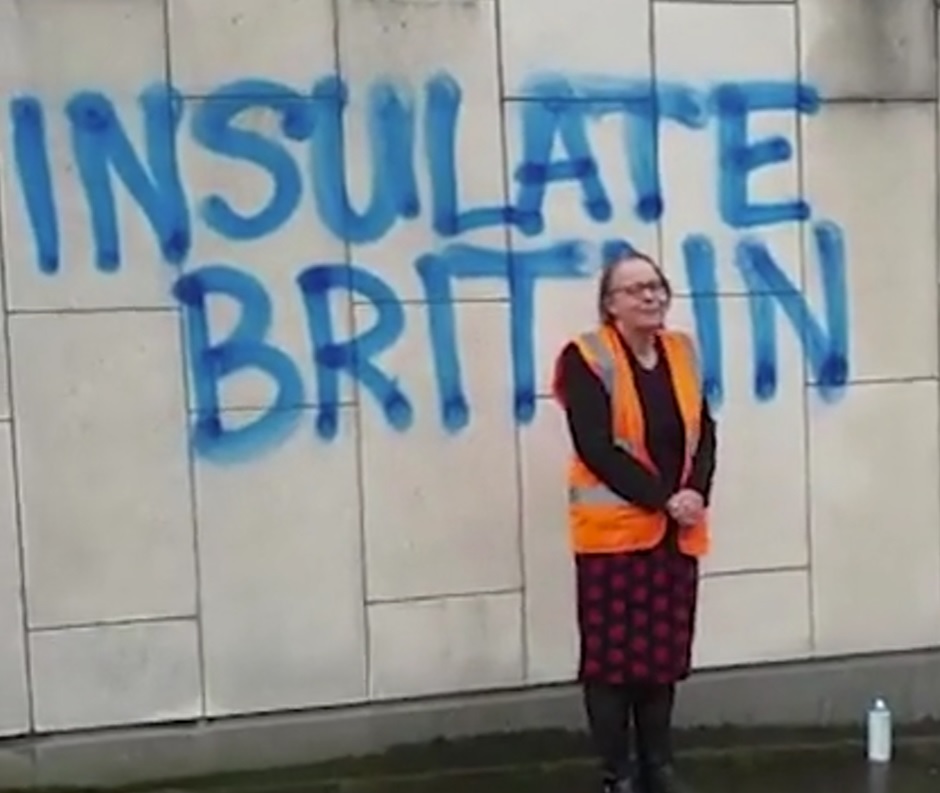Two environmental campaigners from Brighton were among five Insulate Britain protesters to be sentenced today (Friday 9 June) for bringing traffic to a standstill on the M25.
Alexander Rodger, 33, of Ditchling Road, Brighton, and Venetia Carter, 59, of Sutherland Road, Brighton, had denied causing a public nuisance by obstructing the motorway.
But after a four-day trial at Hove Crown Court in April, a jury convicted them and two others – Catherine Eastburn, 56, of St Gerard’s Close, London, and Cameron Ford, 32, of The Homing, Cambridge.
A fifth defendant, Gregory Frey, 27, of Manor House, Ely, pleaded guilty to the same offence.
They were all charged after sitting down in the road at Junction 3 at Swanley and refusing to move during a Monday morning rush-hour protest in September 2021.
They wanted to publicise their campaign for better home insulation as Britain prepared to host the global climate change summit known as COP26.
Kate Temple-Mabe, prosecuting, applied for the four defendants to pay a quarter share each of the trial costs of £14,737.60 – or £3,684.40 each.
Miss Temple-Mabe applied for an extra £600 each in costs from Rodger and Ford after they pleaded guilty to causing a public nuisance at Junction 1 of the M25.
On that occasion they were part of a group who glued themselves to the road, again blocking the road for hours.
Miss Temple-Mabe also applied Frey to pay costs of £2,373.50 after he pleaded guilty in relation to the first protest on the day when his trial was due to start.
She also sought an extra £600 in costs after his guilty plea in relation to the second protest.
Today, at Lewes Crown Court, Judge Stephen Mooney imposed suspended prison sentences on all five protesters.
He ordered them each to pay a four-figure sum towards the costs of the prosecution and told four of the five to carry out unpaid work.
Judge Mooney said that, on Monday 13 September 2021, “many members of the public intended to embark on their day-to-lives.”
He said: “Some were going to work, some were taking children to school, some were visiting friends and relatives in hospital or had medical appointments themselves.
“Those whose journey took them along them the M25 in the Swanley area were shortly to find that their plans were going to have to change.
“They had to change because you all decided to block the Swanley junction of the M25 to publicise your cause, namely the need for houses to be insulated.
“The disruption was substantial. Despite repeated requests by the police, you refused to leave and, as a result traffic was seriously affected for some hours.

“While I do not doubt the sincerity of your beliefs, I cannot help but observe that you all lack any degree of insight as to how your behaviour is regarded by those whose lives you affect.”
To Cathy Eastburn, he said: “It was simply staggering to hear your answer to the question of how you felt about preventing people from being able to see their dying relatives in hospital or keeping important appointments, namely that they were effectively collateral damage.
“And your treatment of them was equivalent to the breaking of ribs when administering CPR (cardio-pulmonary resuscitation).”
“I would be surprised if that approach has in any way encouraged support for your cause among those who might otherwise have been sympathetic to it.”
Two days later, Rodger, Ford and Frey “decided that it was necessary to do exactly the same thing again”.
All three admitted causing a public nuisance at Junction 1 of the M25 at Dartford on Wednesday 15 September 2021.

Judge Mooney said: “I told all of you from the very beginning that if you chose to use the criminal courts as a forum to publicise your view, it would come at a cost.
“You (Carter, Eastburn, Ford and Rodger) could have entered a guilty plea once you had read my rulings which made it clear that you had no defence in law.
“And had you done so, I could have given you credit for those pleas and the expense of a trial would not have been incurred.”
“Mr Rodger and Mr Ford have pleaded guilty to the (Wednesday) 15 September offence today.”
The judge said: “There are no guidelines for this offence but, in my view, the planning involved and the level of disruption caused means that the custody threshold is crossed but in each of your cases it can be suspended.
“I have been made aware of sentences passed in this and other courts in relation to these offences but I must apply my own judgment in assessing the appropriate sentence.

“All defendants have relevant previous convictions of a similar type which I will treat as an aggravating feature.
“I regard your explanation for your actions as amounting to limited mitigation.
“I have had regard to your finances and have substantially reduced the level of costs accordingly.”
Judge Mooney said that he had “had regard to the principle of totality in imposing a just and proportionate sentence”.
The sentences were as follows.
Alex Rodger was sentenced to six months in prison, suspended for 18 months, and 150 hours of unpaid work, on each concurrently. He was ordered to pay £1,800 costs, payable at £100 a month for 18 months.
Cam Ford was sentenced to six months in prison, suspended for 18 months, and 150 hours of unpaid work, on each concurrently. He was ordered to pay £1,800 costs, payable at £100 a month for 18 months.
Greg Frey was sentenced to four months in prison, suspended for 18 months, but was deemed not well enough to carry out unpaid work. He was ordered to pay £1,000 costs, payable at £100 a month for 10 months.
Neesha Carter was sentenced to two months in prison, suspended for 18 months, and 100 hours of unpaid work. She was ordered to pay £1,800 costs, payable at £100 a month for 18 months.
Cathy Eastburn was sentenced to two months in prison, suspended for 18 months, and 100 hours of unpaid work. She was ordered to pay £1,800 costs, payable at £100 a month for 18 months.
…
Earlier, barrister Raj Chada spoke in mitigation for Eastburn, Frey and Rodger. He said: “The defendants acted for conscientious reasons and from the best of motives.
“Each year families choose between heating and eating. We have the least energy-efficient housing in Europe. We can ill afford to to waste energy because of the climate emergency … (it’s) an existential crisis.
“It’s clear that they crossed the line and were guilty of public nuisance (but) perhaps history will find the emitters were the ones guilty of public nuisance.”
He said that National Highways, formerly the Highways Agency, was granted an injunction which came into force after the offences before the court were committed.
Mr Chada said: “The defendants have given undertakings not to conduct further protests on National Highways roads.”
And they had already had to pay four-figure costs related to the injunction, in effect punishing them already, he said, and reducing the likelihood of reoffending.

Mr Chada read a series of glowing character references and said that his clients apologised for any inconvenience caused.
He added that they had signed an undertaking not to repeat what they had done and would face serious consequences if they breached their promise.
In mitigation, Neesha Carter told the court: “I accept that this court has found me guilty of causing a public nuisance. It has found that I interfered with the comfort and convenience of a defined section of the public.
“I have heard from people who suffered stress and loss of earnings and am truly sorry for that.
“When I entered my plea of not guilty, I did so with the hope that the court would judge, as I had, that the disruption my actions caused was necessary and proportionate given the unprecedented threat we face from the behaviour of our climate.
“The acquittal that I’d hoped for did not happen. Nevertheless, I don’t believe that hope was unfounded.
“There have now been 14 public nuisance trials resulting form the Insulate Britain campaign. Of these, all defendants have been acquitted in two cases, with a further four resulting in hung juries.

“I do not believe it would be fair to punish me with heavy court costs for having relied on the legal process to defend myself as best I could.
“The court allowed the jury to hear the reasons why I acted as I did. I trust that my testimony made clear that I chose to take part in this protest not for any personal gain but entirely to serve the public good.
“I understood when I chose to sit in the road that there would be personal consequences, I had taken part in non-violent direct action before and so thought I was prepared.
“However, I did not anticipate quite how much time and stress would follow as I had not expected to be charged with such a serious offence.
“Sentencing can be used as a deterrent. On that aspect, I ask you to consider recent changes in legislation since the Insulate Britain campaign.
“In the past two years, a number of laws have introduced new protest offences and have lowered the threshold for arrest and increased the sanctions for several existing offences.
“Furthermore, civil injunctions have also increasingly been brought to bear on peaceful protesters such as ourselves.

“Even without having breached an injunction, myself and others are now liable for costs. I am now to pay £1,500 to National Highways Limited, with a further possible £4,630 to come.
“Harsh sentencing for disruptive but peaceful protest such as the one I participated in may well have a chilling effect on such protests.
“Peaceful protest is a vital part of a functioning democracy.
“With an increasingly hostile legal climate for protest, I believe the manifest failure of governments to safeguard citizens from present and future harm caused by climate breakdown is in danger of going substantially unchallenged.
“This court can play a positive part by recognising that peaceful protest is not so much a problem but a necessary part of a society seeking a solution to a crisis that threatens us all.”
Cam Ford said: “By stepping on to the motorway, it showed how terribly this government has failed to care for us.
“It showed how broken our mainstream media was in highlighting our inadequate housing and our reliance on a volatile energy market.
“By stepping on to the M25, it showed how desperate we were for change. Right or wrong, we tried something. And it will be future generations who will be best placed to judge our actions.
“When we put on our high-vis jackets, rolled out our banner of Insulate Britain and awaited the media to share our message globally at the time of COP26, we knew what we risked.
“We knew it could lead to this very moment and we went for it. We did it under the gaze of our ancestors, those that disrupted for change. We did it in the name of non-violence. We did it out of love.
“And you can’t take away our love. So it is with sadness and love that I accept my punishment.”
Judge Mooney added: “All of you need to be aware that if you behave in this way again, you will go to prison. I urge you not to.”









Heroes. Doing what we all should be doing in the face of a catastrophe. It should be the oil companies and the government in court, not brave members of the public.
Heroes ? Don’t make me laugh.
Causing mayhem and chaos, putting lives at risk and their own.
No not heroes a bunch of morons.